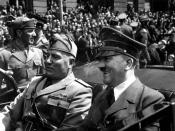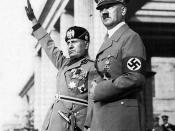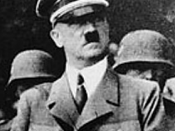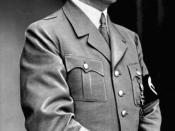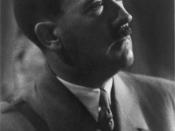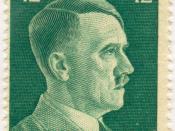Hitler and his party believed in their superiority among other religions or culture. They thought that the eradication of some types of men would be beneficial to the countryÃÂs integrity. They expressed their ideas through negative images and stereotypes. Nazi propaganda was against Jews and other impure cultures and religion. Jews were compared to beasts and were said deceitful and dangerous people of whom Germany should be free. To be able to make his willing work, he used several methods. He thought that reassembling the younger ones would be good and so modified the programs of education and created camps during the 1930ÃÂs.
During the 1930ÃÂs , indoctrination played a critical part in developing a loyal following to Hitler and the Nazis starting with the replacement of some teachers and university professors refusing to collaborate with Hitler. Some courses, programs and themes that used to be taught were replaced and new books published to let everyone be aware of how good Hitler and his Nazis were for the country.
Many courses were used to convey HitlerÃÂs ideology, it was therefore an hidden indoctrination of the younger. Courses were chosen to place the NaziÃÂs culture above any other and so to claim it PURE. Some courses were strongly influenced on this affirmation. Other religions were brought down and seen as impure and treacherous For example, in science courses, young men were taught military science, the different ways to eradicate different races of men and the impact on the world. In Biology, the different themes to be dealt with during the school year were chosen to denigrate the Jewish population mostly. Different methods were used to accomplish the task. This course went through a strong and definite analysis of the different races so as to prove German Nazis racial superiority over all the others. ë Racial instruction û was imposed at the age of 6 and went through all different levels in schools. Racial purity was taught through many examples such as the problems of marriages between two men having a different religion. Sport started to occupy a strong place in students timetable. They were to suffer if they wanted to be recognized and become a strong German. Violent sports were taught such as boxing and army games. If you werenÃÂt good enough in this subject, you could get expelled from the school, Hitler didnÃÂt assume there was any place in this country for the weak as he once said in 1933:_______________________________________________________________________________________ë I want a brutal, domineering, fearless, cruel youth. Youth must be all that. It must bear pain. There must be nothing weak and gentle about it. The free, splendid beast of prey must once again flash from its eyes û_______________________________________________________________________________________And:"I intend to have an athletic youth--that is the first and the chief thing... I will have no intellectual training. Knowledge is ruin to my young men." HitlerIndoctrination was even stronger in History. All the problems Germany had had to face throughout time were said to be the JewishÃÂs and ONLY their fault as well as some other cultures. They were accused unjustly, and were continually belittled. All the blame was put on their heads and were accused of misconduct and treason to the country they now lived in. All of this favoured all members of the party. Schools and teachers, if they were to keep their job had to submit to the demands of the Party. During each course, teachers were encouraged and expected to attack the Jewish culture and beliefs.
Throughout this incredible change in the Education, very few of the young boys and girls who attended schools, didnÃÂt agree on what their teachers were saying. A large percentage of the young men thought it right to listen to their teachers and rely on what they were proposing and suggesting mostly because the sources seemed valuable, genuine and done to the GermansÃÂ only benefit. In addition, there was no need to act reluctantly towards the teachersÃÂ saying because books, political men, historians and teachers believed in the same way and because the teacher wouldnÃÂt reinvent history or beliefs of people. Children were easily convinced by the greatness of the NaziÃÂs Party.
All the Education propaganda used in schools and education system were benefiting the Nazis even if some people didnÃÂt believe in all that was said.
Creating youth camps was another way for the nazis to get hold of the population.
To attract young boys and teenagers, the camps used everything they could starting with uniforms, songs, military parades, slogans and many other. These fascinated them strongly. At first, it was seen as a game going into these camps and a wonderful opportunity. Sports was well appreciated as one of the Hitler Youth leader remembered in source F and many activities were organised. The young men went on ë trips û as shown in source F and for many of them, it was the first time they acceded to real leisure activities. Sports was a way to make friends and the boys enjoyed it a lot. The camps were seen as an ë entry to happy times û.
In addition, these camps replaced schools. The young preferred to join this group and have fun all day long than stay at school with long hours of studying and having to face their parents each night. Teenagers had enough of being surrounded by teachers and parents. Their choice was made a lot more easier as they were considered as MEN and important personalities to whom Leaders accorded confidence. Being part of these camps made them believe that they were useful for their country they had learned to love. Also, Many parents were frightened that their children would report them to the Gestapo, which gave young people a power that they enjoyed keeping an eye on their parents and teachers making sure that they would behave and speak in a way the Nazis would approve it (source A). In source E we are able to see that training for the army and singing were well appreciated activities at all age.
Many young men progressively joined the Hitler Youth movement for all of this ë pleasant û childhood. They were sure to have a good time in the camps from what they had heard. The memberships grew spectacularly high to reach over 82% of the young population in 1939 in Germany with a number of 7 287 470 members compared to the 107 956 member at the end of 1933 which makes a total of 30.5 % of the young population at the time.
Once boys were part of the camps, they had ë political and cultural teachings û (shown in source G) which were redundant throughout time and exposing how GREAT Hitler and the Führer with a constant development of an admiration of Hitler and the Nazis.
Besides the happiness of these places, the boys and girls were politically programmed doing as they were told and to love Hitler without thinking. Most of youngsters engaged in the German army were totally subdued to Hitler, having absolutely no choice of changing opinion.
But, once Germany entered the war a few years later, the lives young people had in these camps werenÃÂt as joyful and happy. Because Germany needed soldiers to attack the opponents, the young men were treated harsher and had to prepare for the war. Much more training was needed which was extremely tiring and hard. As source C tells us, those men were to serve the nation and the community as well as they could. Preparing themselves to go to war was the best thing they could do to serve their country as they had been taught earlier. We can see on source D that from 1938 to the beginning of 1939 (the beginning of the war) the percentage of the number of members of the Youth Movement went up by 5%.
Even if the number of adherents was incredibly high, it didnÃÂt mean that all of them believed in this cause. When the young boys and girls started to ask themselves questions about nazism and the other cultures, they had doubts about the authenticity of the arguments and facts they were given. Those how didnÃÂt believe in nazism and Hitler, and they were many, hid it so as not to have any problem with their leaders.
All the youth were not fanatised and didnÃÂt obey blindly to Hitler. Some youngsters who had the courage resisted, not all as much and in the same ways, but they resisted. And so, many movements were undertaken by the resistant groups who didnÃÂt believe in nazism and were ready to give their lives for the sake of the country and not one manÃÂs which was a loyal act for the sake of democracy.
